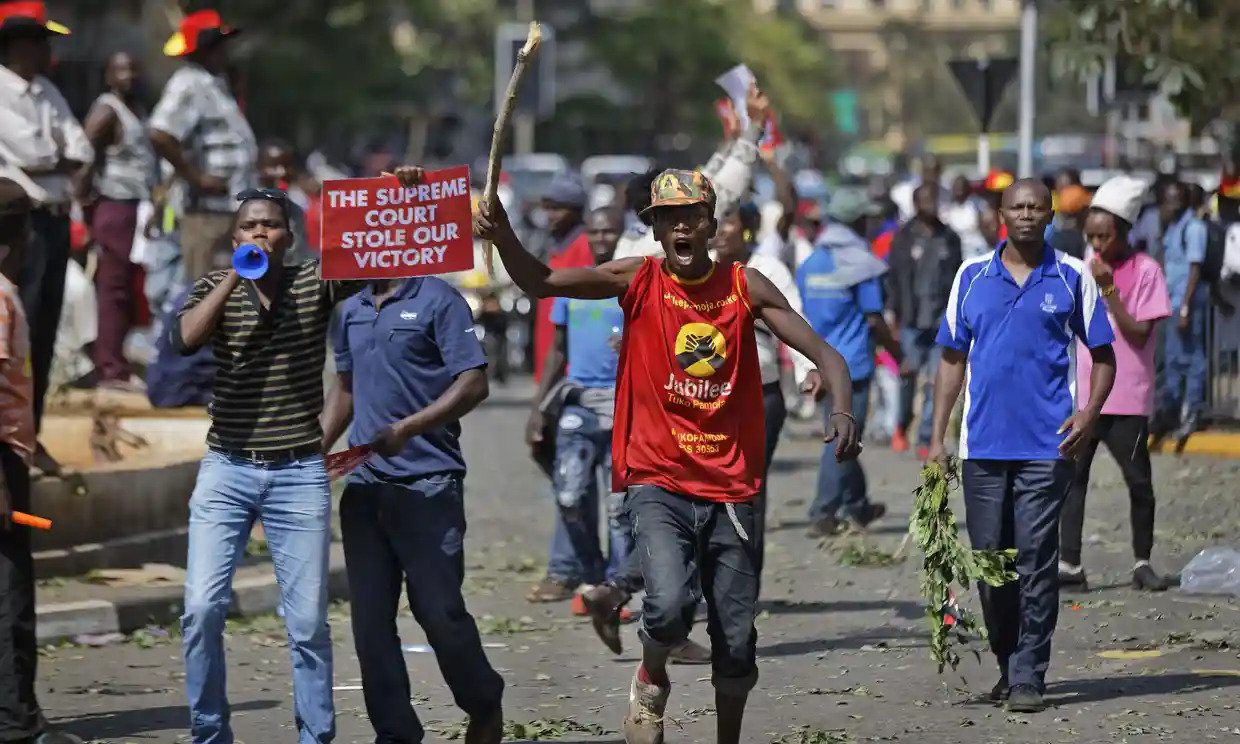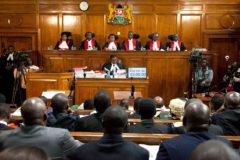
June 12, 2022
The Next Wave provides a futuristic analysis of BizTech and innovation in Africa. Subscribe here to get it directly in your inbox on Sundays at 3 PM (WAT).
In 1991, after decades of a one-party democracy that bore a close resemblance to a dictatorship, Kenya transitioned to a multiparty state. It was a move that was hailed as a shift to true democracy. But Kenya’s transition into a democracy has been a bumpy ride. Take elections, for instance, which are a central aspect of a democracy: Kenya’s nascent democracy has been fraught with electoral violence. As major political parties form, ethnic groups align themselves with them, and political actors exploit inter-communal tensions by instigating these groups to turn against themselves, leading to larger ethnic groups being accused of genocide. Kenya’s first multi-party general elections in 1992—as well as those in 1997, 2008, and 2017—saw significant to high levels of electoral violence.
This August, millions of Kenyans will head to the polls to decide who will lead them. But a storm is brewing. Close to half of Kenya’s 47 counties risk becoming violence hotspots.
Partner Message

Europe’s biggest start-up and tech event is back! Viva Technology brings together start-ups, CEOs, investors, global tech actors, and well-pronounced speakers. It will take place on June 15-18, in Paris. Find out more.
Brewing electoral violence
Of all of Kenya’s violence-ridden elections, the 2007 general elections, which left 1,000 people dead in its wake, displaced over 350,000 persons and threw the country into a crisis, is considered to be the deadliest. Today, the country’s president, Uhuru Kenyatta of the Jubilee Party, governs an economy ridden with debt and inflation, grappling with corruption and trying to recover from COVID-19’s effects. In an election that is already seen as a fight for the country’s future, those in the race to take over from him—William Ruto of the ruling party and Raila Odunga of the Orange Democratic Movement (ODM)—were also on the ballot papers during the elections in 2007 and 2008.

According to researchers, hate speech is a major driver of communal conflicts that erupt during election cycles. Politicians use hate speech to create hostility among groups and significantly increase the risk of violence. Over time, social media platforms have become a fertile ground for these politicians and their allies to amplify such hate speech.
As the public sphere shifts to social media, political discussions on them hold more weight and Kenya’s political actors have tried for the longest time to manipulate such discussions, using hate speech and disinformation. In previous elections, Kenyan political actors have paid top propaganda and data analytics firms to create inciting messaging on social platforms, such as YouTube, in order to win elections or sway public opinion in their favour.
Partner Message

Join leading stakeholders in the health sector at the Lagos Health Summit. The summit will offer idea exchange, networking and business development opportunities. Date: 29th & 30th of June. For more details click here.
Disinformation and hate speech hotbeds
A new report from the Mozilla Foundations revealed that the latest platform used for electoral-related disinformation in Kenya is TikTok. The report, after analysing 130 videos viewed over 4 million times, discovered that disinformation that incites violence along ethnic lines has found its way into the app’s recommendations feed. In the past, Facebook, Twitter, and WhatsApp have been used for spreading electoral disinformation that has resulted in violence, but TikTok’s rise to prominence in the country has seen it flooded with political messaging—even though the platform currently bans political ads—that are estimated to have 38 million combined views.

The report’s author, Odanga Madung, wondered whether TikTok has the “cultural knowledge and resources to properly flag and remove disinformation that presses on the country’s historical nerves”, especially as the company doesn’t have explicit guidelines that flag references to past electoral violence. Other social media companies like Meta Facebook’s parent company treat their content moderators badly, which affects how effectively they can moderate the platform.
TikTok confirmed that it has content moderators focused on Swahili but was mute about the moderators of other widely spoken languages in Kenya. This is especially worrisome because as political actors turn on their troll factory and disinformation engines in preparation for this general election, it will be important that TikTok as well as other platforms that operate in the country understand the nuances of the languages that they are moderating in.
Kenya’s harsh economy has pushed citizens to trade their voices for $10–$15 to become influencers-for-hire, thus birthing a thriving disinformation industry. This shady industry has been used by politicians and political groups to neutralise public outcry and influence civic debates online.
As Kenyans return to the polls, social media platforms have yet to commit to taking stringent measures to clamp down on disinformation and hate speech on their platforms. As at last count in 2021, 11 million of Kenya’s 54 million population use social media and 40.4% of the country can access the internet. These tech companies must understand that there are millions of people capable of deciding Kenya’s future on their platforms. They must therefore commit to promoting educational content to help users spot hate speech and electoral disinformation; share electoral guidelines; and accurately label content on their platforms by applying local context and nuances. One way they can do this is by hiring and adequately compensating local content moderators that understand Kenya’s most-spoken languages, Kiswahili and Sheng, and the country’s many historical contexts.






















